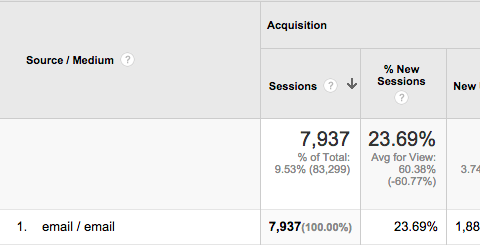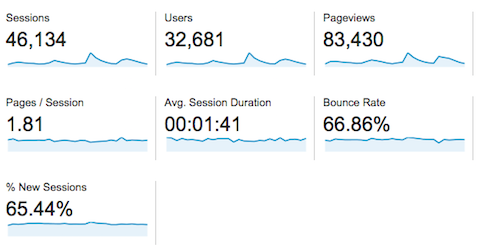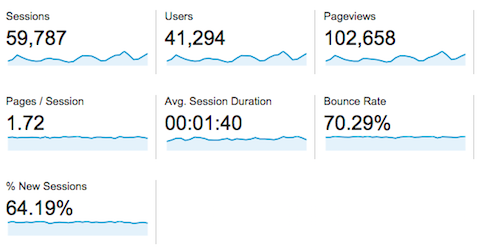A while back, we started a blog in the marketing realm. When we first started out, our traffic was flat.
But after a few months, we figured out a process that has allowed us to grow our traffic consistently—a process we could replicate. We got to a point where we were adding about 20,000 new visitors each month.
Best of all, we did it without spending a dollar on marketing.
The tactics we used will work for anyone. They work so well that the results we experienced with our nutrition blog were even better, which is crazy since we don’t have a brand in that space and we don’t have many assets we can leverage to help it grow.
So, how did we achieve those results, and how can you gain similar ones?
5 Steps to Grow Your Blog Traffic
Here’s our proven formula to increase your blog traffic:
- Collect emails
- Write extremely detailed content
- Build a fan base
- Striker partnerships
- Write more often
Step 1 – Collect emails
We’ve mentioned this in the past, but chances are you still aren’t collecting emails from your blog. Other than search traffic, it’s the most consistent form of traffic you can get.
Just look at NeilPatel.com. Here is the email traffic we’ve received over 30 days:

That’s not too bad, considering our list size at the time was 3,612.
So, how do you collect emails? The simplest ways are through page takeovers, interstitials, sliders, and bars. The beautiful news is you don’t have to be technical to use any of those features…you can just use Hello Bar, which is free.

In addition to using Hello Bar, you should consider using Thrive Leads, which allows you to offer bonus content.
For example, if we wrote a blog post on 11 marketing tips that will double your traffic, the bonus content could be two extra tips that weren’t mentioned in our post. In order for you to receive that bonus content, you would have to give us your email address.
Sure, this type of email collection takes a bit of time, but it will account for 50% of the emails you collect.
Once you have a list, every time you write, email to your list subscribers letting them know about your latest post. Here is the email template we use:
Subject: Title of your blog post
Hey,
We just wanted to share with you the latest [Insert your blog name – and make this a link to your post] blog post. Let us know what you think.
[Insert the title of your blog post – and make this a link to your blog post] [Insert the first paragraph from your blog post] [Insert the second paragraph from your blog post] Click to continue [make the “click to continue a link]Thanks.
[Insert your name].P.S. [Add a promotional message here]
Just in case the template is confusing, here is an example of an email we sent out, based on this template:
Hey,
I just wanted to share with you the latest Quick Sprout blog post. Let me know what you think.
You’ve heard of social media calendars before, but do you know what they are and how to use one?
Chances are you don’t. And that’s okay… I didn’t either when I entered the realm of social media marketing. But once I learned about it and how to use it, it change how I marketed my businesses on the social web. [click to continue]
Thanks,
Neil.P.S. If you want to see how I can help you grow your traffic and revenue, go here.
Step 2 – Write extremely detailed content
The average blog post on here ranges from 4,000 words on the low end to 8,000 words on the high end.
We know what you are thinking: that’s a lot of text. And it is.
On top of that, each post contains tons of screenshots and images. If you don’t have time to add images, you can always pay someone to do it—like we do.
But just look at our search traffic over an eight month period:
- September – 2,017 visitors
- October – 3,952 visitors
- November – 4,087 visitors
- December – 5,572 visitors
- January – 9,029 visitors
- February – 13,783 visitors (only 28 days in this month)
- March – 20,543 visitors
- April – 24,540 visitors (projected)
How have we been able to increase our search traffic on a consistent basis? Is it link building?
Nope!
It’s purely by writing extremely detailed content. This allows us to get ranked for thousands of long tail keywords that aren’t competitive.
If you are going to write content, consider writing extremely detailed content. Write something so detailed that people wouldn’t dare to copy you—that’s when you’ll know you have done a good job.
Step 3 – Build a fan base
Fan base? We know what you are thinking: why would anyone want to be your fan, right?
Well, you need to stop thinking that way. Everyone has fans.
How do you build a loyal following? You can start by trying to help everyone out. We know we’ve mentioned this in the past, but are you actually responding to each and every comment you receive on your blog?
Probably not…
And when your readers email you, are you taking the time to email them back? You should care about your readers and do whatever is in your power to help them out. And they will keep coming back.
Step 4 – Strike partnerships
Business development may not sound sexy, but it works well. There are already people in your space with whom you can potentially work because they are not your direct competitors.
For example, we struck a deal with Cyberchimps, who provide WordPress themes. Some of their themes are paid, while others are free.
Together, we will be offering more marketing-friendly themes—not just from a code perspective but also from a design perspective. It took six months for this deal to fully go live, but once it did, it helped us generate more traffic.
This partnership allowed them to attach “marketed by Neil Patel” links to the bottom of each of their themes. To ensure that we didn’t get penalized by Google, the links were “no-followed,” but they still drove good referral traffic.
How did we get this deal? And, more importantly, how can you get a similar deal? Well, we emailed around 30 people in the space telling them that we had an idea that will help them grow their businesses faster.
Some people responded, while others didn’t. We got on the phone with those who responded and pitched our idea to them. We broke down how it would separate them from other theme providers, and we even explained the benefit to us.
Once we had all the conversations and a few people said yes, we decided with whom we wanted to work.
Step 5 – Write more often
We used to publish blog posts on NeilPatel.com once a week. Over time, we ramped it up to twice a week.
Here is our monthly traffic when we were posting once a week:

And here is the traffic after we started posting twice a week:

As you can see, the more frequently you post, the more search traffic you will receive, assuming your content is high in quality. Our goal is to ramp up our personal blog to three posts a week as that will help us hit the 100,000 monthly visitor mark really fast. The only issue is finding the time…
Conclusion
Growing your blog traffic doesn’t have to be rocket science. Follow the steps above, and you too will be able to get more traffic.
Sure, your growth rate may not be as rapid as ours (as we are able to leverage our name to get certain deals done), but still—you should see more traffic.
If you had to pick just one thing to follow, consider writing long, detail content. What we learned by blogging on NeilPatel.com is that content that’s between 4,000 and 8,000 words does extremely well in search engines.
